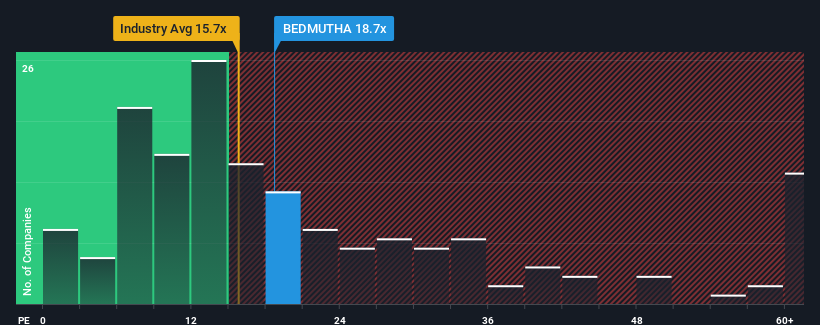- India
- /
- Metals and Mining
- /
- NSEI:BEDMUTHA
Bedmutha Industries Limited (NSE:BEDMUTHA) Surges 34% Yet Its Low P/E Is No Reason For Excitement
Bedmutha Industries Limited (NSE:BEDMUTHA) shareholders have had their patience rewarded with a 34% share price jump in the last month. Looking further back, the 10% rise over the last twelve months isn't too bad notwithstanding the strength over the last 30 days.
Although its price has surged higher, given about half the companies in India have price-to-earnings ratios (or "P/E's") above 27x, you may still consider Bedmutha Industries as an attractive investment with its 18.7x P/E ratio. Nonetheless, we'd need to dig a little deeper to determine if there is a rational basis for the reduced P/E.
Recent times have been quite advantageous for Bedmutha Industries as its earnings have been rising very briskly. One possibility is that the P/E is low because investors think this strong earnings growth might actually underperform the broader market in the near future. If you like the company, you'd be hoping this isn't the case so that you could potentially pick up some stock while it's out of favour.
See our latest analysis for Bedmutha Industries

Does Growth Match The Low P/E?
In order to justify its P/E ratio, Bedmutha Industries would need to produce sluggish growth that's trailing the market.
If we review the last year of earnings growth, the company posted a terrific increase of 39%. Although, its longer-term performance hasn't been as strong with three-year EPS growth being relatively non-existent overall. Accordingly, shareholders probably wouldn't have been overly satisfied with the unstable medium-term growth rates.
This is in contrast to the rest of the market, which is expected to grow by 26% over the next year, materially higher than the company's recent medium-term annualised growth rates.
With this information, we can see why Bedmutha Industries is trading at a P/E lower than the market. Apparently many shareholders weren't comfortable holding on to something they believe will continue to trail the bourse.
What We Can Learn From Bedmutha Industries' P/E?
The latest share price surge wasn't enough to lift Bedmutha Industries' P/E close to the market median. Generally, our preference is to limit the use of the price-to-earnings ratio to establishing what the market thinks about the overall health of a company.
As we suspected, our examination of Bedmutha Industries revealed its three-year earnings trends are contributing to its low P/E, given they look worse than current market expectations. Right now shareholders are accepting the low P/E as they concede future earnings probably won't provide any pleasant surprises. Unless the recent medium-term conditions improve, they will continue to form a barrier for the share price around these levels.
And what about other risks? Every company has them, and we've spotted 3 warning signs for Bedmutha Industries (of which 2 are potentially serious!) you should know about.
If you're unsure about the strength of Bedmutha Industries' business, why not explore our interactive list of stocks with solid business fundamentals for some other companies you may have missed.
Valuation is complex, but we're here to simplify it.
Discover if Bedmutha Industries might be undervalued or overvalued with our detailed analysis, featuring fair value estimates, potential risks, dividends, insider trades, and its financial condition.
Access Free AnalysisHave feedback on this article? Concerned about the content? Get in touch with us directly. Alternatively, email editorial-team (at) simplywallst.com.
This article by Simply Wall St is general in nature. We provide commentary based on historical data and analyst forecasts only using an unbiased methodology and our articles are not intended to be financial advice. It does not constitute a recommendation to buy or sell any stock, and does not take account of your objectives, or your financial situation. We aim to bring you long-term focused analysis driven by fundamental data. Note that our analysis may not factor in the latest price-sensitive company announcements or qualitative material. Simply Wall St has no position in any stocks mentioned.
About NSEI:BEDMUTHA
Bedmutha Industries
Engages in the manufacture and export of steel wire and wire products in India.
Adequate balance sheet with low risk.
Similar Companies
Market Insights
Community Narratives




